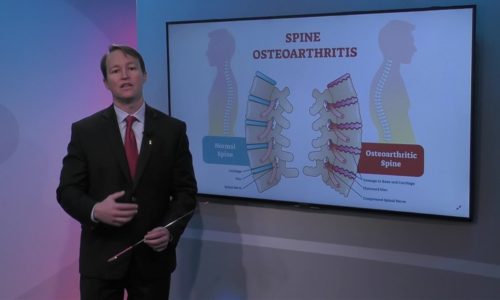Arthritis: Signs and Symptoms |
Arthritis can be diagnosed through signs and symptoms such as joints are achy and back is hurting, explains Dr. Ronald Tolchin, Medical Director of the Baptist Health Center for Spine Care.
On physical exam therapists use loss of range of motion, tendonitis and tightness to diagnose arthritis. In spine cases, also physicians palpate that feeling of a bony restriction and they use diagnostic studies (x-Ray, MRI), too, he describes.
Arthritis in the back is very common, the specialist affirms. He adds there are two forms of arthritis: osteoarthritis, which is degenerative, and rheumatoid arthritis, which is an immunological disease.
Transcript
So let’s talk about one common one which is arthritis at the back, so how do you diagnose this and what is it?. Okay so arthritis can be diagnosed through signs and symptoms, so symptoms patients will tell you their joints are achy, that for example we’re talking about back pain today ,their back is hurting, so those are symptoms that they have or they feel tight in the morning when they get up, the signs that a clinician uses on physical exam are loss of range of motion for example if we’re talking about the wrist joint if you lose some of the rest of the range of motion of the wrist and you feel a restriction of a bony restriction then that could be due to arthritis, it could also be due to soft tissue tightness, tendonitis and things like that, but when we look at the spine we use those physical signs, loss of range of motion, and we sometimes palpate that, that feeling of a bony restriction and then of course we use diagnostic studies like x-rays, that would be the first thing we would do is x-rays of the spine, and then if we need to go on to a more advanced imaging we would use a cat scan, or an MRI. Is taht common, the arthritis in the back?. Yes it is, there’s two forms of arthritis the one that we’re most familiar with is osteoarthritis which is degenerative arthritis and that occurs as we age, everyone everyone is going to get that as our body ages okay, we can do things to slow it down, we can’t reverse it yet, and then the other form of arthritis is rheumatoid arthritis, that is a different type of arthritis that is an immunological disease, so it’s a systemic disease that affects the joints particularly the, the capsule of the joint, and the synovial fluid, and there are changes that that goes through and starts to break down your joint, and it’s essentially we’re breaking down our own joints when we have rheumatoid arthritis and it’s immunological process, you need to be on certain medications to combat that, these are very strong medications that have to be highly monitored usually monitored by rheumatologist who specializes in rheumatoid arthritis and Rheumatologycal diseases.








